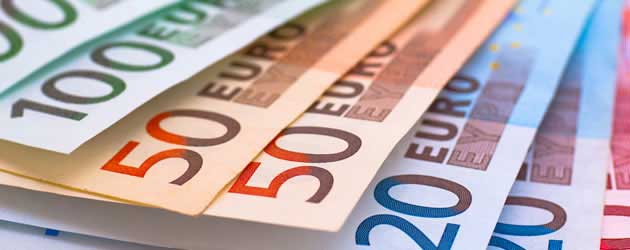
On Tuesday, the Pound (GBP) exchange rate received a bit of a kicking from the Euro (EUR) and other major peers as weaker-than-expected inflation spooked economists into lowering their bets that the Bank of England (BoE) will raise interest rates. On Wednesday that changed slightly as unemployment and wage growth data came in better than forecast.
Sentiment towards the Euro remained under pressure as a run of economic data releases heightened concerns that the Eurozone is heading towards a recession. Data released on Tuesday showed that the regions industrial production fell more than expected in August and that economic sentiment in Germany, the currency blocs leading economy fell to its lowest level since 2012. Despite all that, the Euro managed to batter the Pound lower on the back of the UK inflation figures.
Wednesday’s session however saw the Pound manage to claw back some ground to inch back towards the 1.26 level.
Data out of Germany showed that inflation stagnated to remain at the ultra-low level of 0.8% for a third consecutive month. Confirming to a flash estimate released at the end of September, the federal statistics office Destatis calculated in final data that German inflation stood at just 0.8 percent year-on-year last month, unchanged since July. The last time the nations inflation rate was lower than the 0.8% level was back in 2010.
Sterling found support from data, which showed that UK unemployment fell more than forecast to its lowest level in six years and wage growth improved for a second consecutive month.
According to the Office for National Statistics, the UK’s unemployment rate dropped to 6% in the three months to August, down from the previous reading of 6.2%.
‘There were 1.97 million unemployed people, 154,000 fewer than for March to May 2014 and 538,000 less than a year earlier. This is the largest annual fall in unemployment on record. Records for annual changes in unemployment begin in 1972,’ said the ONS.
Wages including bonuses increased at an annual rate of 0.7% whilst wages without bonuses rose by 0.9%, better than forecasts.
The claimant count fell by 18,600 last month, compared to expectations for a decline of 35,000 people. Augusts’ figure was revised to a drop of 33,200 people from a previously reported decline of 37,200.
Pound to Euro Exchange Rate News
The GBP/EUR exchange rate is likely to experience volatility on Thursday due to the publication of the latest Eurozone Inflation data. Economists are expecting inflation to have improved in September but if the figure comes in poorly, we can expect the Euro to fall on heightened expectations that the European Central Bank (ECB) will have to introduce new stimulus measures in order to encourage growth and inflation.
UPDATE
The Pound Sterling to Euro exchange rate is currently trending in the region of 1.2497.
On Thursday the Pound has rallied against the single currency after a hawkish speech made by Bank of England policymaker Martin Weale.
Weale suggested that the improvement in unemployment should be met with a benchmark rate increase in anticipation of inflationary pressure. He did, however, acknowledge that further declines in inflation could persuade him to rethink his stance on an immediate rate hike.
The Euro has declined on Thursday as a result of speculation that the 18-nation currency bloc may be facing a debt-crisis which could undermine economic recovery. The European Union has started a two-week examination of the Euro-area governments’ draft budgets in the hope of quelling a crisis before it arises.
Euro Exchange Rates
[table width=”100%” colwidth=”50|50|50|50|50″ colalign=”left|left|left|left|left”]
Currency, ,Currency,Rate ,
Euro, ,US Dollar,1.2647 ,
,US Dollar,1.2647 ,
Euro, , Pound Sterling,0.7942 ,
, Pound Sterling,0.7942 ,
Euro, ,Australian Dollar,1.4514 ,
,Australian Dollar,1.4514 ,
Euro, ,Canadian Dollar,1.4363 ,
,Canadian Dollar,1.4363 ,
Pound Sterling, ,Euro,1.2594 ,
,Euro,1.2594 ,
US Dollar, ,Euro,0.7907 ,
,Euro,0.7907 ,
[/table]

